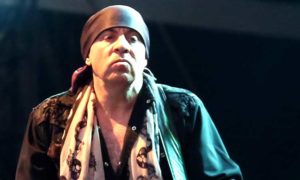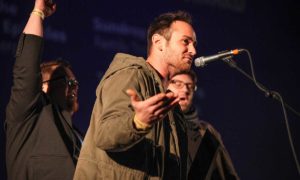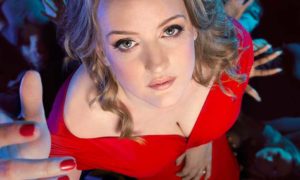A single string drives Djug Django. Ithaca’s Gypsy swing band features the washtub bass playing of Syracuse native Jim Sherpa, who began thumping the gutbucket in the mid-1970s for the Water Street Boys jug band in Oswego, where he studied theater in college.
After spending several years playing on the streets of New Orleans, Sherpa now holds down the bottom for Djug Django, a snappy octet also featuring fiddler Eric Aceto, clarinetist Brian Earle, drummer Al Hartland, pianist Chad Lieberman and guitarists Harry Aceto, Doug Robinson and Dave Davies, who doubles on trombone.
Every Wednesday from 6 to 9 p.m., this eclectic aggregation draws an enthusiastic crowd of jitterbuggers to downtown Ithaca’s Lot 10, a second-floor bistro at 106 S. Cayuga St., just off the State Street Commons. For the past five years, the band has made annual Salt City appearances as guests of the Jazz Appreciation Society of Syracuse (JASS), and it will do so again on Sunday, Jan. 31, 4 to 7 p.m., at Pensabene’s Casa Grande, 135 State Fair Blvd. Tickets are $15; call 471-1289 for details.
Djug Django specializes in the music of Roma guitarist Jean Baptiste “Django” Reinhardt (1910-1953), who founded the Quintette du Hot Club de France along with fiddler Stephane Grappelli. Hot Club specialties revived by Djug Django included “Nuages,” “Honeysuckle Rose” and “Exactly Like You.” The combo also plays Dixieland standards such as “Bourbon Street Parade” and “Struttin’ with Some Barbecue,” often showcasing guest trumpeter Frank Campos, who teaches at Ithaca College’s Whalen Center for Music.
“This is one of the hottest little bands I have ever heard,” Campos says. “Every individual in this group is a brilliant and distinguished performer on his own, but when you put them together the band becomes even greater than its parts. I play all kinds of music from classical to jazz, but playing with Djug Django is a special joy because everybody swings so hard. When we come together, something amazing happens.”
Djug Django’s repertoire ranges from standards such as “Creole Love Call” and “Undecided” to original tunes by Dave Davies such as “Mudbone,” a paean to a pain-in-the-butt New Orleans busker. Davies shares lead vocal duties with Robinson, who sings rarely heard tunes such as “Frim-Fram Sauce” and “C’est Magnifique.” They play the standards “You’re the Cream in My Coffee” and “Besame Mucho,” the traditional “La Villa Rosa,” and Django Reinhardt tunes such as “Minor Swing” and “Daphne.”
Djug Django is a cooperative band in which all members contribute ideas. Each musician understands his goal and collectively they have a knack for selecting material that perfectly complements the Django Reinhardt pattern.
“The end result has a delicacy and refinement we rarely witness in jazz,” said the late JASS board member Pat Carroll, a veteran cornetist who led the Irish Channel Jazz Band here. “The group’s overall musicality is on a very high level indeed: sophisticated and dead-on. In fact, there’s a visible relaxation. These guys really enjoy playing together, and that spirit comes across clear as crystal.”
While the Quintette du Hot Club de France had Louis Vola playing double bass, Djug Django is driven by the spirited Jim Sherpa. He’s showcased on “Hit That Jive, Jack,” “Old Folks at Home” and, aptly, “Mr. Rhythm Man.”
The washtub’s single string may seem limited, but Sherpa makes the most of it. Carroll, an astute observer of the jazz scene for more than six decades, was duly impressed: “This is a rhythm instrument, and Jim has a natural sense of rhythm plus the skill to obtain a full range of sound out of a single string. Simply amazing.”
Rhythm runs in Sherpa’s veins. He’s the son of octogenarian Joe Sherpa, who has retired as doorman at Hotel Syracuse and in earlier years played drums for the Mario DeSantis Orchestra.
For band information, visit watershed-arts.com/djug.
Jim Sherpa: All Washed Up
By
Posted on

Jazz band Djug Django brings an unorthodox instrument to the table.
Djug Django.













